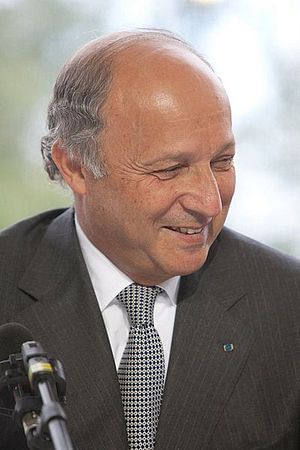We live in strange times: neoconservative American Iran hawks and French socialists found some common ground this weekend. French Foreign Minister Laurent Fabius effectively shocked watchers of the latest round of P5+1 negotiations on Iran’s nuclear program by rebuking an interim draft deal at the eleventh hour. This led to an odd alignment where Sen. John McCain (R-Ariz.), known for his hawkish stance on Iran’s nuclear program, tweeted ""Vive La France on Iran – The French save the West from a very bad nuclear deal with #Iran.”
A deal seemed all but certain going into Saturday after there were reports that John Kerry, Sergey Lavrov, and Chinese Vice Foreign Minister Li Baodong (yes, missing the start of the historic Third Plenum) had all flown into Geneva (with Hague, Westerwelle, and Fabius there as well). There was every reason for observers to have been optimistic about the possibility of a phase-one interim deal for Iran. Above all, no one expected the French – who are generally restrained in matters of heavy-handed diplomacy, using nary a veto on the U.N. Security Council – to be the troublemakers.
The core of the deal was speculated to be based around a simple tit-for-tat where Iran would have suspended all uranium enrichment activity for temporary sanctions relief. Iran’s theoretical compliance with this deal would have helped build trust and open the path to a phase-two comprehensive solution to the nuclear standoff. Ultimately, everyone left Geneva empty-handed.
Laurent Fabius’ intransigence is a misguided setback in this case. Diplomacy with Iran takes time, and must be gradual in terms of the concessions offered by both sides. As my colleague Zachary Keck argued in an earlier column in The Diplomat’s Editor’s Blog, Iran’s negotiators were effectively poised to sign a deal that met the most fundamental demands of the P5+1: in effect, there is good reason to believe that without Fabius’ exception to the deal, the P5+1 would have walked away with a handy diplomatic victory in hand.
The issue of the IR-40 heavy-water plutonium reactor at Arak is concerning, to be sure, and I concede that Fabius is right to draw attention to it. Where Fabius is at fault, however, is focusing the terms of a phase-one deal around activity at Arak. The P5+1 must choose what concessions to extract from Iran in the interim agreement and including Arak is simply foolish at this point (when Fordow and Natanz are the real concerns). It is conceivable that Zarif may receive the go-ahead to agree to an interim agreement that includes Arak, but this would leave very little for the Iranians to concede in a phase-two agreement.
Interestingly, while Arak has always flown low on the P5+1 radar, it has always been point of vocal contention by Israel. For Israel – whose current Likud government under Binyamin Netanyahu has no reservations about militarily striking Iran should conditions deteriorate – Arak is a ticking time-bomb. There are concerns that should Iran insert fuel rods at the reactor, an attack would result in an environmental disaster – thus the notion of a so-called “plutonium zone of immunity.” My colleague Zachary Keck will further examine the French connection with Israel in this case in a forthcoming column on this blog – do keep your eyes peeled for that.
Arak is definitely not a non-issue in the negotiation process, but its urgency falls squarely below the uranium enrichment sites. Diplomacy requires prioritization and for an interim deal, the P5+1 should be able to forgo the Arak issue with a mere perambulatory acknowledgement. Mark Hibbs, writing for the Carnegie Endowment for International Peace, wrote a somewhat timely and prescient piece that argues that the policy mechanics of dealing with Arak are certainly manageable given its status as an above-ground, visible facility. In any final agreement, spent fuel would be transported for reprocessing, possibly under IAEA safeguards.
Fabius may have succeeded in delaying Iran’s so-called “deal of the century,” but it is but a matter of days until the P5+1 meet again. The timeframe certainly presents enough time for the P5+1 allies to work out their differences so that the next meeting with Iran doesn’t end in a disappointing failure to implement a first-step move towards resolving international disagreements over Iran’s nuclear program. There should be concern that the failure of this last round of Geneva talks might galvanize sanctions hawks in the U.S. Congress (such as Sen. Bob Corker) to work towards a deal to disable the national security waiver clause – effectively neutering the White House and its executive authority on sanctions. Fortunately, given the competence displayed by the current Congress and a lack of bipartisan support, ten days is a highly optimistic timeline for any such piece of legislation.
Demonstrating its continued willingness to engage with the P5+1, Iran has gone ahead and signed an agreement with the IAEA and the U.N. that will involve inspections of the controversial IR-40 site at Arak. John Kerry, in an attempt to save face after the failed negotiations, was reluctant to point fingers at Fabius – discord between allies always looks bad. One failure seems to be tolerable in the grand scheme of things. A second could be deleterious given that it would lend credence to hawkish claims – in both the United States and Iran – that a path toward peace is unattainable.
Ankit Panda is Associate Editor of The Diplomat and has participated in European and American Track-II meetings on the Iranian nuclear program. Follow him Twitter at @nktpnd.

































